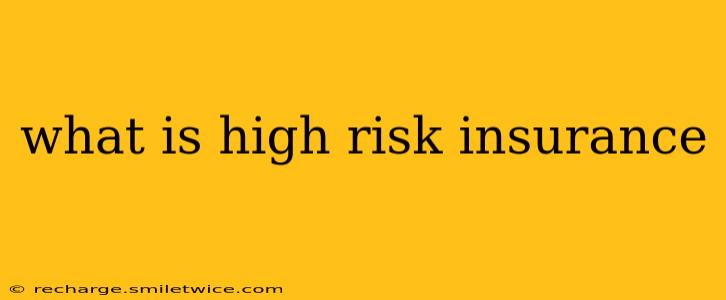High-risk insurance refers to insurance policies designed for individuals or businesses deemed to pose a greater-than-average risk to insurers. This increased risk translates to higher premiums compared to standard policies. But what exactly constitutes "high-risk," and what types of coverage fall under this umbrella? Let's delve into the specifics.
What Makes Someone or Something a High-Risk Insurer?
Several factors contribute to a person or business being classified as high-risk. These factors vary widely depending on the type of insurance. For example:
-
Auto Insurance: A history of numerous accidents, traffic violations (especially DUIs/DWIs), or a poor driving record significantly elevates risk. Young, inexperienced drivers often fall into this category as well. The type of vehicle driven can also play a role, with high-performance cars typically attracting higher premiums.
-
Homeowners Insurance: Factors like the age and condition of the property, its location in a high-risk area (prone to natural disasters like floods or wildfires), or a history of claims can lead to higher premiums. Certain breeds of dogs known for aggression might also influence the risk assessment.
-
Health Insurance: Pre-existing conditions, a history of significant health issues, or a family history of specific illnesses can make obtaining affordable health insurance challenging. The cost of managing these conditions contributes to the increased risk.
-
Life Insurance: Individuals engaging in high-risk occupations (e.g., stunt performers, firefighters), those with pre-existing health conditions, or those with a history of substance abuse often face higher premiums or even difficulty securing life insurance altogether.
-
Business Insurance: Businesses operating in high-risk industries (e.g., construction, manufacturing), those with a history of accidents or claims, or those located in high-crime areas may struggle to secure affordable coverage.
What Types of Insurance Are Considered High-Risk?
While any insurance policy can become high-risk based on individual circumstances, certain types are more commonly associated with higher premiums:
- Non-Standard Auto Insurance: This category caters specifically to drivers with poor driving records who are unable to obtain standard auto insurance.
- Flood Insurance: Properties located in floodplains or areas with a high risk of flooding usually require specialized flood insurance at a higher cost.
- Earthquake Insurance: Similar to flood insurance, earthquake insurance protects against seismic activity and is often expensive in earthquake-prone regions.
- Umbrella Insurance: This supplementary insurance provides broader liability coverage beyond standard policies. While not inherently high-risk, those with higher net worth or increased liability exposure often seek this coverage, and premiums can be substantial.
What are the implications of high-risk insurance?
The most significant implication of high-risk insurance is the increased cost. However, it’s crucial to weigh this against the potential financial consequences of not having adequate coverage should an unforeseen event occur. The peace of mind that insurance provides often outweighs the higher premiums for those in high-risk categories.
How Can I Reduce My High-Risk Insurance Premiums?
While you cannot change inherent risk factors like age or location, you can take steps to mitigate some risks and potentially lower your premiums:
- Improve your driving record: Defensive driving courses and maintaining a clean driving record are crucial for reducing auto insurance costs.
- Home improvements: Upgrades to your home's security system or structural integrity can reduce homeowners insurance premiums.
- Maintain good health: Regular health checkups and managing pre-existing conditions effectively can influence health insurance premiums.
- Shop around: Comparing quotes from multiple insurers is essential to secure the best rates.
Ultimately, understanding the factors that contribute to high-risk insurance is crucial for securing appropriate coverage at a manageable cost. It's always recommended to consult with an insurance professional to find the most suitable and affordable options based on your individual circumstances.
